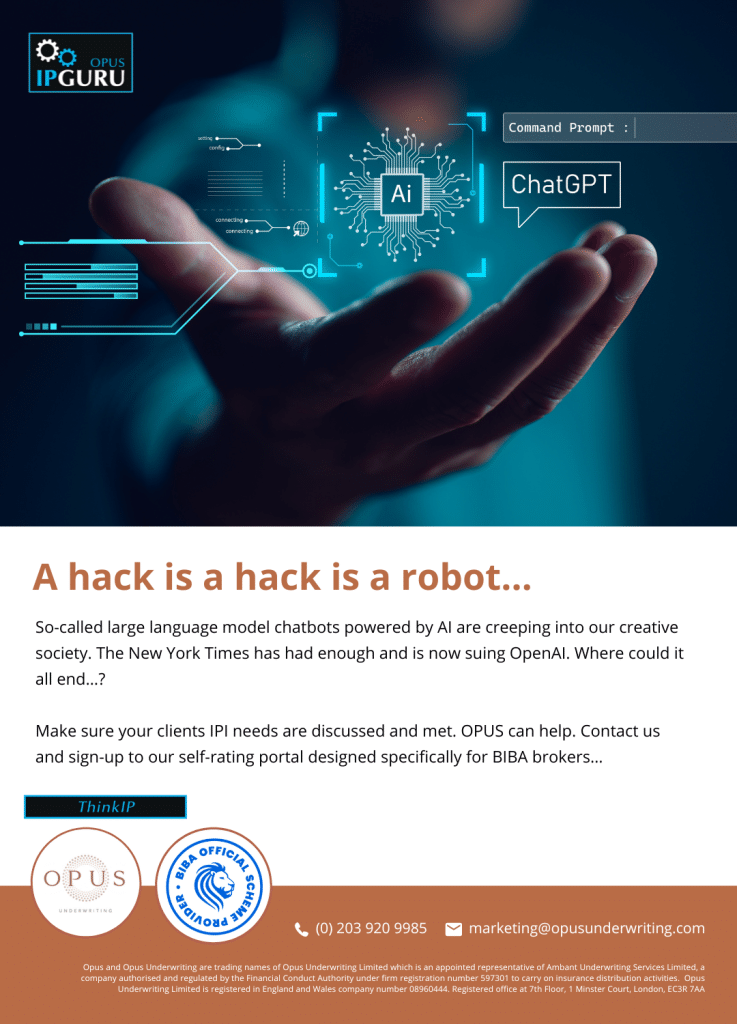Open season on OpenAI
What would John-Boy Walton make of it all? Sitting on his eponymous mountain 90 years ago, whiling away the hours waiting for the outbreak of WW2 in his grandma-made itchy-looking shirt. He’d be busy penning homespun stories in The Blue Ridge Chronicle about Ike Godsey (usually) to entertain the gentle folk in the fictitious Jefferson County of Virginia.
I refer, if it isn’t obvious, to The New York Times v OpenAI. This case could be the savior of hacks like John-Boy. Simply, it’s that important. When we think of creative writing, much of which has been under siege recently from AI, we tend to think of novelists, poets, scriptwriters, lyricists and the like. The poor old journeyman ‘journo’ rarely gets a look in. Not now. For they are creative too. Yes, they are. In an everyday, ephemeral way. Perhaps, no less important than a Hollywood screen writer. Ok, that’s a stretch. Bear with me. Hacks like John-Boy can morph into famous writers quicker that a Mayfly.
If you don’t get the importance of this case – go back to the lumber yard and help your Pa.
Great journalism…must feed the mind and move the heart.
So said Rupert Murdoch. Great journalism shouldn’t be ‘scraped’ from the internet behind paywalls and fed to rapacious large language model, generative AI machines in breach of copyright, say The New York Times (NYT) in a legal suit filed on 27 December 2023 against Microsoft-backed OpenAI. It can if it’s ‘fair use’ of publicly sourced material say OpenAI and the work is not reproduced in its entirety. As reported in the Financial Times, NYT claims OpenAI profited from the:
“…exploitation and misappropriation of The Times’s intellectual property.”
Victor Tangermann writing for Futurism recently questioned whether it’s acceptable for OpenAI to:
“…vacuum up everyone’s content and charge for it without paying them.”
The Irish Times posited that:
“…it seems reasonable that those who create the original content without which these systems could not exist should have a claim to any sort of profits.”
And that, in a few short, news media soundbites, is the debate, argument and legal dispute currently blazing its way like a summer bushfire through editorial desks around the world. It’s a hot one, for sure.
Don’t take advantage of any man…
The damages being claimed by NYT runs to billions of dollars. It says it owns the copyright to its back catalogue of journalism. It paid for it and has the right to exploit it for profit, if it wants, when it wants. It is claimed that chatbots like Chat GPT are now competing with established journalism as a source of reliable news information and all from an allegedly unfair ‘springboard’ advantage having ingested millions of NYT articles.
It is also argued OpenAI would rather not pay expensive licensing fees to legitimately use NYT material because it’s costly to keep feeding and ‘training’ hungry AI models.
Although, many in the IP world believe, logically, this is where the case will end up – with a licensing agreement – as IP cases so often do. A multi-million-dollar-a-year licensing deal having already been settled with Associated Press.
Sharing was our first duty and happiest privilege…
That may have been so for the dungaree-clad folk on Walton Mountain but not in the real world. Content must be paid for, so it seems. If you want to build an AI product fine. But you must, say NYT, seek permission, make payment, or both. Some, like Professor emeritus of New York University Gary Marcus, are openly critical of present AI company practice. He makes a fair point:
“If the current batch of AI companies cannot create AI that performs reasonably well based on public domain sources and whatever they are prepared to pay to license…they should go back to the drawing board – and figure out how to build software that doesn’t have a plagiarism problem – rather than fleecing artists, writers and other content providers.”
Tough words for a tough problem.
NYT v OpenAI is a fascinating and important lawsuit. It will probably dominate the IP litigation landscape this year. The ‘fair use’ defense has yet to be challenged in the courts (to this extent) and the future of traditional journalism is quite probably up for grabs. Diehard writers will say you must pay for decent creative writing otherwise your left with a ‘garbage in – garbage out’ data situation. Or as Gary Marcus put so well:
“We will all suffer in the end, fed a mediocre stew of regurgitate.”
This case, if you ponder on it, is little different from earlier squabbles over social media platforms muscling-in on established outlets for publishing and music. It’s a turf war at its core, only the creative forums are now fed-up of appeasement. Poland has been invaded. Enough is enough. They now feel they have nothing to lose by drawing battle lines, donning flak-jackets, tin hats and suing for vast damages. A peace deal may yet be struck in the form of a license. There is such a lot for one party to lose if collaboration and agreement are jilted at the altar of judicial decision.
You can’t own a mountain…
Said Grandpa Zeb. The big tech beasts seem to own so much else. I guess we’ll see. From Tacitus to here. That’s some journey. Is the simple lowly trade of the human observer scribe now doomed. Are we at our terminus.
Could it be:
“Goodnight John-Boy”.
Surely not.
Murray Fairclough
Development Underwriter
OPUS Underwriting Limited
+44 (0) 780 145 9940
underwriting@opusunderwriting.com








